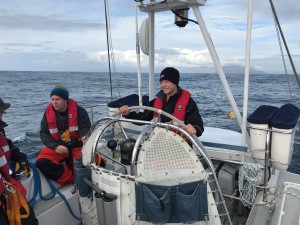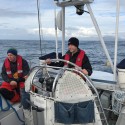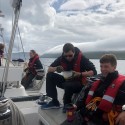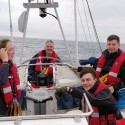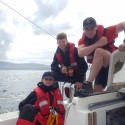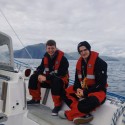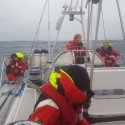“It was one of the most exciting things I’ve ever done, and if I get the opportunity again, I would love to do more ocean sailing!”
Medical student, Ed Duffy, took part in EX: ARCTIC EXPRESS LEG 2 in June 2018, sailing in the North Atlantic.
It was quite an experience! In this interview we found out how it changed his life.
What was it like going on the expedition?
As a complete novice to yacht sailing, I was unsure of what to expect when I applied to Ex Arctic Express. I imagined a relaxing couple of weeks, perfect to unwind after my exams. I was wrong.
After three days of training, we set off from Stornoway, blissfully unaware of the approaching Storm Hector (which our skipper had conveniently forgotten to mention). What followed was the most challenging couple of days we could have imagined. Storm Hector was a force 10 gale. With winds of over 50 knots and waves crashing over the boat, we quickly became cold, wet and tired. These 48 hours were a massive challenge for me, but I am hugely grateful for the experience. The conditions forced us to pull together and work efficiently as a team. Whether we were coordinating a tac, or combining our strength to hoist a sail, good communication was essential and input and feedback from each member was vital. It made me a better sailor and I gained a lot of resilience as a result. Under great leadership from the skipper, mates and watch leaders, the crew kept performing and we emerged on the other side at the Faroe Islands.
Luckily, the rest of the trip went more smoothly. There was a moment during the final leg, from Heimaey to Reykjavik, where the sun was out, we had all three sails up, and suddenly we became surrounded by dozens of pilot whales and some dolphins occasionally jumping by the bow. It was the most amazing experience and one that I will remember for a very long time. Ex Arctic Express was a fantastic opportunity which I wouldn’t have got outside of the OTC, and it’s left me eager to continue sailing. I gained a lot of confidence in myself as a sailor and I now hope to progress to get my day skipper qualification. This would allow me to organise future sailing trips for other troops, lead them on a yacht and hopefully help them gain some similar experiences to those that Ex arctic Express has given me. I will definitely be able to apply the resilience and team working skills which I gained into both my military and civilian life and I would love to provide the same opportunity to others.
What and where are you studying?
I’m a medical student at UCL. I’ve just finished my second year and will be undertaking an integrated BSc in Surgical Sciences next year before studying for three further years in mostly clinical settings.
Why did you join ULOTC?
I joined ULOTC at the beginning of my first year at university in 2016. I joined largely because I had been considering a career in the army and wanted some experience of it so I could make a more informed decision. I also thought it looked a really fun way of spending my spare time and I’ve always been keen on pushing myself, both physically and mentally, which I thought the OTC would offer me through field exercises, PT sessions and adventurous training.
What do you want to do after finishing your studies?
I want to do something with the army, however, I’m not sure whether I would like a regular career as an army doctor or whether I want a civilian career as a doctor and a reserve career elsewhere in the army. I feel that the second option would provide more opportunity to enjoy military skills and drills. As far as medicine is concerned, I’m unsure which field I would like to go into. My clinical exposure is still fairly limited, however I like the idea of something to do with trauma, or possibly orthopedics.
Can you contrast your student life with this experience – I imagine it will be very different!
Student life is hugely different! For a start, it is much less physically demanding, and nothing can compare to Storm Hector in terms of challenge and excitement. You also become closer to other crew members more quickly than you might do to fellow students due to the hardship you go through together!
The experience sounds very challenging – how has this helped you?
It certainly was a challenge! Working in my watch in such difficult conditions on Ex Arctic Express has helped my teamwork skills. Communication and coordination were vital, as certain manoeuvres such as a tack required multiple, simultaneous actions by different members of the crew. Since a lot of my study is done in groups, for example projects and clinical work, I believe these skills will be very applicable. As I mentioned in my reflective piece, I gained a lot of resilience through the challenges that Ex Arctic Express posed. As a medical student and doctor, you do experience difficult situations, whether that’s exams, a high workload sustained for extended periods of time, or seriously ill patients who deteriorate under your care. You need resilience to get through these, and I believe the experiences I gained on ex Arctic Express will help me endure these events in the future.
I’m sure it must have tested your resilience and nerve? How did you cope? Was it frightening? Did you fear falling overboard?
Ex Arctic Express definitely tested my resilience. I coped by looking at the other people around me. We were all going through the same thing, and I thought if they’re still going, there’s no reason why I shouldn’t be! It was a little frightening at times, especially since it was my first experience sailing, but I was confident in the leadership I was under including the skipper, mates and my watch leader, as well as my fellow crew members, so at no point was I genuinely scared. I didn’t fear falling overboard as Terry, our skipper, had been very careful to enforce safety discipline including the wearing of life jackets at all times when on deck and remaining clipped on when the sea was rough. Since our training was good and I trusted the equipment, falling overboard was not something that worried me.
Now you have returned to everyday life how do you look back on that experience? Does normal life seem a bit dull and boring in comparison?
At my lowest point, when I was sea sick, exhausted and still miles away from land, I was quite sure that I would stick to coastal sailing in the future. However now I’m back and have had time to reflect, I genuinely cherish the experience. It was one of the most exciting things I’ve ever done, and if I get the opportunity again, I would love to do more ocean sailing! Normal life seems quiet in comparison, however after a term at university, followed by the sailing trip and then the ULOTC annual training exercise, it’s nice to be home and spending time with my family again!

